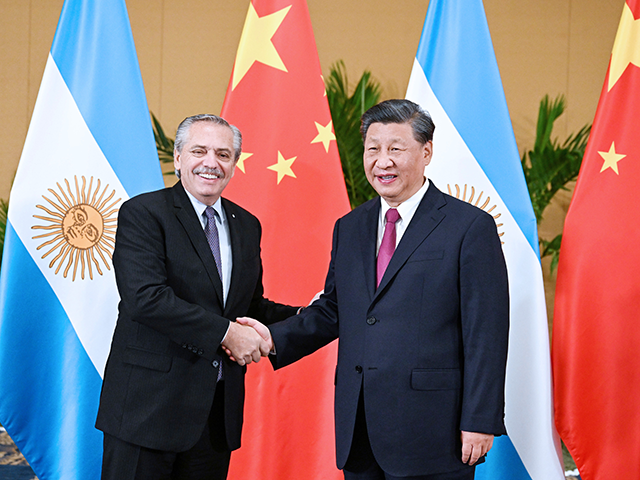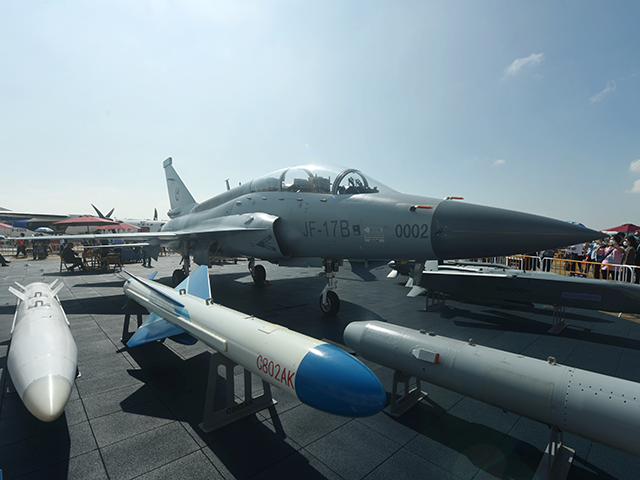Argentina’s embassy to China said on Tuesday that President Alberto Fernandez is considering the purchase of JF-17 “Thunder” fighter jets from China — three months after a deal for JF-17s fell apart and Fernandez said his government would not buy any military aircraft in the near future.
“Argentina has to allocate its resources to more important things than the purchase of military aircraft,” Fernandez said in December after scrapping a plan to buy JF-17s, which can sell for up to $25 million apiece, depending on the exact model and its accessories.

Chinese President Xi Jinping meets with Argentine President Alberto Fernandez in Bali, Indonesia, November 15, 2022. (Photo by Rao Aimin/Xinhua via Getty Images)
The Argentinian president noted at the time that his country had no adversaries that would require advanced warplanes to fight, and his regional agenda was for peace and cooperation, not war.
The collapse of the deal in December was a major setback for China, which is pushing hard to expand its influence in Latin America and get nations in the region hooked on its military hardware. Argentina was seen as a hot sales prospect after Fernandez’s predecessor Cristina Fernandez de Kirchner paid a high-profile visit to China in 2015 for meetings with dictator Xi Jinping.
The Argentine government staunchly denied it was considering any purchases of Chinese fighter jets until 2021 when it began admitting the idea was in the “technical-economic and financial evaluation phase.”
Competitors for Argentina’s business included fighters from India and Russia, along with secondhand American-made F-16s offered by Denmark. Some other options were ruled out because they contained British-made parts, a sticking point because Argentina has been under a U.K. military embargo ever since the Falkland Islands war in 1982.
In January, French media reported that China was cutting deals behind the scenes to obtain a naval base in Argentina’s Tierra del Fuego province, providing a vital naval gateway to Antarctica. Beijing is interested in Antarctica for strategic reasons, because it provides ideal locations for intercepting communications across the southern quarter of the planet, and because Antarctica has natural resources the Chinese are eager to exploit.
The U.S. Naval Institute (USNI) advised the British to rethink their strategy toward Argentina and lift the decades-old arms embargo, at least by enough to make the F-16s from Denmark a strong competitor against the JF-17, because moving forward with that purchase would open the door for China to secure a more troubling degree of military cooperation with Argentina.
This advice was evidently not heeded and the economic and political obstacles that scuttled the deal for Chinese fighters in December have apparently been resolved.
According to a social media post from the Argentine embassy in China on Tuesday, Ambassador Sabino Vaca Narvaja met with Defense Minister Jorge Taiana in Buenos Aires recently to work out plans for defense integration with the Chinese. The embassy said these plans include buying armored fighting vehicles from China in addition to jet fighters and may extend to exchanges of military personnel.
China’s state-run Global Times was ecstatic, crowing on Wednesday that the deal was all but sealed, in part because China promised Argentina unwavering support for its “legitimate claim to exercise full sovereignty over the Malvinas Islands,” i.e. the Falklands.
“Chinese experts” also assured the Argentines that the JF-17 is cheaper than the alternatives, and if Buenos Aires springs for the top-of-the-line Block 3 model, it will get “very advanced systems including an active electronically scanned array (AESA) radar, a combination of China’s top beyond-visual-range and short-range missiles, as well as avionics and flight control systems.”
Before signing on the dotted line, the Argentines might want to check out the zero-star review for JF-17s from Myanmar, which is complaining of constant malfunctions and major structural flaws in the JF-17s it bought six years ago.
Myanmar bought its planes from Pakistan, which is the co-manufacturer of the JF-17, after the ruling military junta was slapped with sanctions and embargoes from most of the civilized world. Problems with the JF-17s grew so severe in 2022 that the junta demanded a team of engineers from Pakistan to address them.
All 11 of Myanmar’s JF-17s are currently out of service due to malfunctions and structural defects. This is a major annoyance for the Myanmar military, which is impatient to drop bombs on the people who do not wish to be ruled by a junta.
Canada’s Firstpost reported Wednesday that one reason the December deal fell apart was that Argentina “refused to accept the junk” that China and Pakistan tried to sell it. Reading between those lines, China might be trying to recover Argentina’s business by promising to deliver a much better quality batch of JF-17s than Myanmar was saddled with.

COMMENTS
Please let us know if you're having issues with commenting.